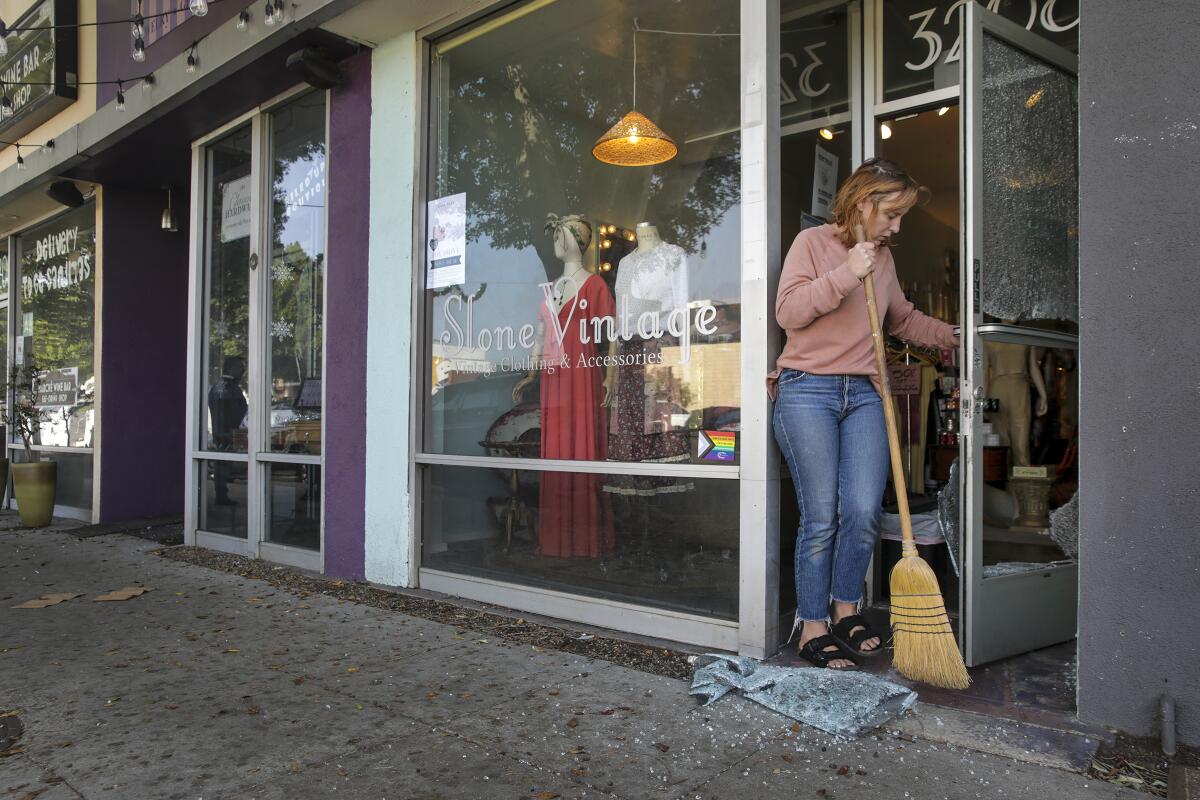Gov. Gavin Newsom proposes spending more than $300 million to combat California crime

SACRAMENTO — As concerns and political criticism rise over a rash of brazen retail thefts across California, Gov. Gavin Newsom on Friday announced a package of grants for police agencies and prosecutors to crack down on the organized crime rings believed to be largely responsible.
Newsom said the $270 million in grant money, as well as $25 million for small businesses victimized by theft, will be in his proposed budget when it’s released in January. Since the governor’s spending plan isn’t likely to be approved by state lawmakers until June, however, that money will not be immediately available.
The governor said organized gangs have struck in California and across the country, “heightening the anxiety” Californians feel about their safety.
“The rules are the rules, the laws are the laws, and we just want people to be held to account,” Newsom said.
Republicans have seized on highly publicized recent smash-and-grab thefts and violent crimes to criticize the Democratic governor and his party’s leadership of California, alleging their policies are responsible for an increase in lawlessness.
“The Democrats’ relentless push for their ‘criminals first’ agenda has turned this once-majestic state into a sanctuary for criminals,” Senate Republican Leader Scott Wilk of Santa Clarita said in a statement after Newsom’s news conference.
Anne Hyde-Dunsmore, campaign manager for Rescue California, called the proposed grants for law enforcement “great news,” but said the effort was not enough. Hyde-Dunsmore’s organization unsuccessfully pushed to recall Newsom in September and has been critical of his crime policies.
She said Newsom should also call a special legislative session to modify elements of Proposition 47, the 2014 voter-approved ballot measure that reclassified some felony drug and theft offenses as misdemeanors. Proposition 47 also raised the dollar amount for which a theft can be prosecuted as a felony from $400 to $950.
“We’ve got to get that back down to at least $400,” Hyde-Dunsmore said. “He needs to call a special session of the Legislature right now to roll some of these statutory changes back so law enforcement can do its job.”
For Newsom, rising concerns about crime could become a political vulnerability in his 2022 reelection campaign. But so far, no major challenger — Republican or Democrat — threatens Newsom’s prospects for a second term.
That’s not the case for California Atty. Gen. Rob Bonta, whom Newsom appointed in March to fill a vacancy left by Xavier Becerra’s departure to become U.S. Health and Human Services secretary.
Sacramento County Dist. Atty. Anne Marie Schubert, a former Republican now running as an independent, and GOP candidate Nathan Hochman have both launched campaigns promising a Department of Justice that’s tougher on crime.
Schubert is running social media ads that feature video of smash-and-grab thefts and promise to “stop the chaos in our criminal justice system.”
Bonta made a name for himself among California’s progressives during his tenure as a state assemblyman representing Alameda. He’s long campaigned to eliminate cash bail and end the death penalty in the state, and introduced bills in the Capitol to accomplish both. Bonta also championed a law to ban for-profit, private prisons and immigration detention centers, which he’s now defending in court as attorney general.
Bonta appeared with Newsom at Friday’s news conference, vowing to ensure that the members of retail theft rings face “serious consequences.” During his announcement, Newsom said the attorney general’s office would create a new unit to focus exclusively on cracking down on organized thefts.
Newsom has long advocated for reducing recidivism through educational opportunities and mental health programs instead of enacting new tough-on-crime laws that have historically swelled California’s prison population.
“We’re not walking back on our commitment in the state to advance comprehensive reforms. We’re not walking back in this state to right the wrongs of the past,” Newsom said. “We’re not walking back as it relates to the rules and regulations established by the voters and others that I believe are sound and right.”
He said that property crimes have been on the decline in California since Proposition 47 took effect and said nothing in the law prevents arresting and prosecuting people accused of misdemeanors.
Roughly 30 states have increased the dollar amount threshold for felony theft offenses since 2005, according to the National Conference of State Legislatures. More than half of all states have a felony theft threshold of $1,000 or more. In Texas, the threshold for a felony offense is $2,500.
On Friday, Newsom also defended his decision to try to eliminate illegal ghost guns and assault rifles in California through new legislation modeled after a Texas law that bans most abortions.
The key provision of the Texas law lets people file civil lawsuits against anyone who participates in certain abortions, which Newsom and Bonta hope to replicate in California by allowing citizens to take legal action against manufacturers and distributors of firearms.
The move is mostly considered a political power play by Newsom, but underscores the lengths to which he and his allies will go to challenge the gun industry and distinguish California from red states such as Texas.
Newsom on Friday said his proposed budget will also include $25 million for a state gun buyback program, and $20 million to increase drug interdiction efforts at the U.S.-Mexico border.
More to Read
Sign up for Essential California
The most important California stories and recommendations in your inbox every morning.
You may occasionally receive promotional content from the Los Angeles Times.











